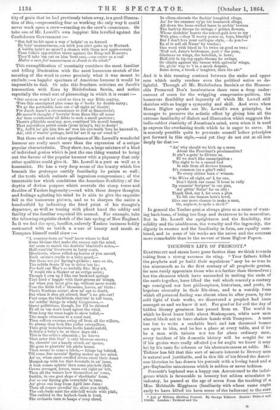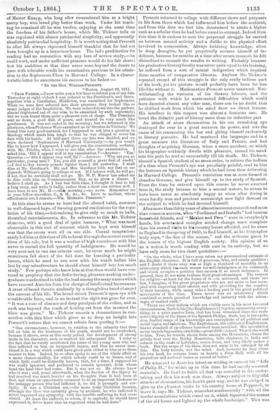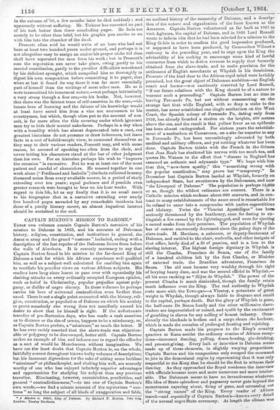TICKNOR'S LIFE OF PRESCOTT.*
ELECTRICITY and steam have gone farther than we think towards taking from a strong sarcasm its sting. "Your fathers killed the prophets and ye build their sepulchres" may be as true in the nineteenth as in the first century of all prophetic genius, for men rarely appreciate those who see farther than themselves ; but the elements which have succeeded in uniting the ends of the earth together, have lifted the veil which scarcely a century ago consigned our best philosophers, historians, and poets, to hopeless obscurity in their life-time, and to a worship from which all perscinal feeling was absent when in after years, by the cold light of their works, we discovered a prophet had been amongst us and we knew it not. For good or fur evil the day of hidden literary greatness has passed from us. The world in which he lived knew little about Shakespeare, while now men almost blush not to have shaken hands with Tennyson. A man has but ta write a readable book and teb- thousand homes are open to him, and he has a place at every table, and if he be a man with talents nat too far above ordinary men, every incident of his domestic history will be sought for as if his genius were really affocted (ss for aught we know it may be) by his taste for tobacco or his abstemiousness at table. Mr. Ticknor has felt that this sort of minute interest in literary men is natural and justifiable, and in this life of his friend the Ameri- can historian he has drawn his portrait with a loving hand and a pre-Raphaelite minuteness which is seldom or never tedious. Prescott's boyhood was a happy one. Accustomed to the indul- gence which is favourable to honesty but seldom stimulates to industry, he passed at the age of seven from the teaching of a Miss Mehitable Higginson (familiarity with whose name ought early to have killed his keen sense of the ludicrous) to the care
• Life of William Prickling Prescott. By George Ticknor. Boston: Tieknar nod. Fields. London : Trnbner and Co.
of Master Knapp, who long after remembered him as a bright merry boy, who loved play better than work. Under his teach- ing he remained till he was twelve, enjoying at the same time the freedom of his father's house, which Mr. Ticknor tells us was regulated with almost patriarchal simplicity, and apparently absolutely patriarchal hospitality. It is worth noting that Prescott in after life always expressed himself thankful that he had not been brought up in a luxurious home. The lad's predilection for reading bad no connection with any love of severe study,—he could work, and under sufficient pressure would do his fair share ; but his ambition at that time never went beyond the desire to pass with tolerable credit his examination previous to his admis- sion to the Sophomore Class in Harvard College. In a charac- teristic letter he announces his success to his father :—
" To TEE Hex. Wiasaast PREsarrr.
"Boston, August 23, 1811.
"Dais FATHER, —I now write you a few lines to inform you of my fate. Yesterday at eight o'clock I was ordered to the President's, and there, together with a Carolinian, Middleton, was examined for Sophomore. When we were first ushered into their presence they looked like so many judges of the Inquisition. We were ordered down into the parlour, almost frightened out of our wits, to be examined by each separately; but we soon found them quite a pleasant sort of chaps. The President sent us down a good dish of pears, and treated us very much like gentlemen. It was not ended in the morning ; but we returned in the afternoon, whenProfessor Ware examined us in 'Grotius de Veritate.' We found him very good-natured, for I happened to ask him a question in theology which made him laugh so that he was obliged to cover his face with his hands. At half-past throe our fate was decided, and we were declared Sophomores of Harvard University.'—As you would like to know how I appeared, I will give you the conversation, verbatim, with Mr. Friable, when I went to see him after the examination. I
asked him, 'Did I appear well in my examination ?'—Answer Yes.' Question Did I appear very well, Sir ?'—Answer: Why are you so
particular, young man ? Yes, you did yourself a great deal of credit.' —I feel to-day twenty pounds lighter than I did yesterday. I shall dine at Mr. Gardiner's. Mr. and Mrs. Gardiner both say that on me depends William's going to college or not. If I behave well, he will go; if not, that he certainly shall not go. Mr. W. P. Mason has asked me to dine with him on Commencement Day, as he gives a dinner. I believe I shall go. As I had but little time, I thought it best to tell a long story, and write it badly, rather than a short one written well. I have been to see Mr. H—thie morning ;—no news. Remember me to your fellow-travellers, C., & M., &c., &c. Love to mother, whose affectionate son I remain.—Wm. tilOICLING PRESORTS."
At this time he seems to have had the absurd habit, common to well-disposed boys, of forming general resolutions for the regu- lation of his time,—determining to give only so much to balls, theatrical entertainments, &c. In reference to this Mr. Ticknor observes, with a good deal of quiet humour, "What was most observable in this sort of account which he kept with himself was that the errors were all on one side. Casual temptations easily led him at this time of life to break through the severer restric- tions of his rule, but it was a matter of high conscience with him never to curtail the full quantity of indulgences. He would be very sure not to run one minute over, ho sever much he might sometimes fall short of the full time for learning a particular lesson, which ho used to con over with his watch before him lest by any misadventure he should cheat himself into too much study." Few perhaps who knew him at that time would have ven- tured to prophesy that the frolic-loving, pleasure-seeking under- graduate wasdestined to take the lead among the many names which have rescued America from the charge of intellectual barrenness. A crust of bread thrown aimlessly by a thoughtless hand changed the current of his life. The bread struck Prescott's open eye with considerable force, and in an instant the sight was gone for ever. "It was a case of obscure and deep paralysis of the retina, and as such was beyond the reach of healing art from the moment the blow was given." Mr. Ticknor records a circumstance in con- nection with this blow which gives us so deep an insight into Prescott's nature that we cannot refrain from quoting it :— " One circumstance, however, in relation to the calamity that thus fell on him in the freshness of his youth, should not be overlooked, because it shows, even at this early period, the development of strong traits in his character, such as marked his subsequent life. I refer to the fact that he rarely mentioned the name of the young man who had thus inflicted on him an irreparable injury, and that he never men- tioned it in a way which could have given pain either to him or to those nearest to him. Indeed, he so often spoke to me of the whole affair as a mere chance-medley, for which nobody could be to blame, and of which little could be distinctly known, that, for a time, I supposed he was really ignorant, and preferred to remain ignorant, from whose hand the fatal blow had come. But it was not so. He always knew who it was ; and, years afterwards, when the burden of the injury ho had received was much heavier on his thoughts than it had been at first, and when an opportunity occurred to do an important kindness to the unhappy person who had inflicted it, ho did it promptly and cor- dially. It was a Christian act,—the more truly Christian because, although the blow was certainly given by accident, he who inflicted it never bYpreaSed any sympathy with the terrible suffering he had occa- sioned. At least the sufferer, to whom, if to anybody, he should have expressed it never knew that he regretted what he had done." Prescott returned to college with different views and purposes in life from those which had influenced him before the accidents and from this date we find him determined to attain a higher rank as a scholar than he had before cared to attempt. Indeed from this time it is curious to note the perpetual struggle he carried on between mental activity and a dislike to the physical effort involved in composition. Always imbibing knowledge, often in deep draughts, he yet perpetually accuses himself of in- dolence, because for months at a time after severe research he felt disinclined to commit the results to writing. Probably because his productive literary faculty was never quite equal to his learning, he suffered from a sort of mental indigestion which required those months of comparative idleness. Anyhow Mr. Ticknor's repeated record of this struggle is the only really tedious part of his book, yet his picture would probably have been far less life-like without it. Mathematics Prescott never mastered. Not- withstanding the vastness of his literary labours, and the patience with which he surmounted difficulties which would have daunted almost any other man, there can be no doubt that he disliked work from which his mind drew no direct lessons. His intellect in this respect was almost a feminine one. He loved the didactic part of history more than its inductive part
An attack of acute rheumatism in his one remaining eye destroyed for ever in a great measure its power, and was the cause of his renouncing the bar and giving himself exclusively to literary pursuits. He had mastered the languages and in a great measure the literature of Italy and France, and had thoughts of acquiring German, when a mere accident, on which his biographer evidently dwells with pleasure, turned his mind into the path he trod so successfully till his death. Mr. Ticknor, himself a Spanish student of no mean order, to relieve the tedium of a time when Prescott's eye was peculiarly painful, read to him the lectures on Spanish history which he had been then delivering in Harvard College. Prescott's resolution was at once formed to abandon German, and give himself up to the study of Spanish. From the time he entered upon this course he never swerved from it, the study became to him a second nature, he seems to have been never so absolutely happy as when after diving in some hardly won and precious manuscript new light dawned on the subject to which he had devoted himself.
After more than thirty years of almost incess ant research and mow than common success, when "Ferdinand and Isabella" had become household friends, and "Mexico and Peru" were in everybody's hands, his overtasked energies needed change more complete than his annual visits to his country house afforded, and he came to England in the spring of 1850, to find himself, as his biographer truly says, "the lion of the season," and the welcome guest in the homes of the highest English society. His opinion of us as a nation is worth reading with care in its entirety, but we have only room for two short quotations :—
" On the whole, what I have seen raises my preconceived estimate of the English character. -It is full of generous true, and manly qualities ; and I doubt if there ever was so high a generous, of morality in an
aristocracy which has such means for self-indulgence at its command, and which occupies a position that secures it so much deference. In general, they do not seem toabuse their groat advantages. The respect for religion—at least for the forme of it —is universal, and there are few, I imagine, of the groat proprietors who are not more or less occu- pied with improving their estates, and with providing for the comfort of their tenantry, while many take a leading part in the groat political movements of the time. There never was an aristocracy which combined so much practical knowledge and industry with the advan- tages of exalted rank." "There are other defects which are visible oven in his most favoured circumstances. Such is his [the Englishman's] bigotry, surpassing every- thing, in a quiet passive form, that has been witnessed since the more active bigotry of the times of the Spanish Philips. Such, too, is the exclu- sive, limited range of his knowledge and conceptions of all political and social topics and relations. The Englishman, the cultivated Englishman, has no standard of excellence borrowed from mankind. His speculation never travels beyond his own little—great-little—island. That is the world to him. True, ho travels, shoots lions among the Hottentots, chases the grizzly bear over the Rocky Mountains, kills elephants in India and salmon on the coast of Labrador, comes home, and very likely makes a book. But the scope of his ideas does not seem to be enlarged by all this. The body travels, not the mind. And, however ho may abuse his own land, he returns home as hearty a John Bull, with all his prejudices and notional tastes as rooted as before."
He returned to America intent on writing in earnest his "Life of Philip If.," for which up to this time he had merely amassed materials. He lived to finish all that was essential to this under- taking, and then his work was done. Always subject to frightful attacks of rheumatism, his health gave way, and he was obliged to give up the pleasant visits to his country home at Pepperell, to leave it, says Mr. Ticknor, somewhat sentimentally " with all the tender associations which rested on it, which tapestried the scenes of the old house and lighted up the whole landscape." This was in the autumn of '58, a few months later he died suddenly ; and apparently without suffering. Mr. Ticknor has executed no part of his task better than these concluding pages. He feels too acutely to be other than brief, but his graphic pen carries us on with him into the chamber of the dead.
Prescott often said he would write of no hero who had not been at least two hundred years under ground, and perhaps it is not altogether easy to assign an author his proper niche till time shall have separated the man from his work ; but in Prescott's case the separation can never take place, owing partly to his mental constitution, partly to the peculiar difficulties occasioned by his deficient eyesight, which compelled him so thoroughly to digest his own composition before committing it to paper, that when at last it found its way there it was far more essentially part of himself than the writings of most other men. He as it were transmitted his innermost nature,—not perhaps intrinsically a very strong though a fine one,—to his books. Not, however, that there was the faintest trace of self-assertion in the mau,—Iiis innate love of learning and the fulness of his knowledge would at least have saved him from a vice not uncommon to his countrymen, but which, though often put to the account of con- ceit, is far more often the thin covering under which ignorant men try to hide their mental nakedness. Perhaps in a day when with a humility which has almost degenerated into a cant, our greatest historians do not presume to draw inferences, but leave facts in a sort of kaleidoscopic view, to commend themselves as they may to their various readers, Prescott may, and with some reason, be accused of speaking too often from the chair, and never letting his characters stand at the bar of other judgment than his own. For an historian perhaps his wish to "improve the occasion '' is excessive. But he was at least one of the most patient and careful of chroniclers. He massed together in one work alone (" Ferdinand and Isabella") the facts collected in many thousand notes from every available source, in a period of study extending over ten years; equal patience and if possible even greater research were brought to bear on his later works. With regard to this life, let us say finally that it is no small merit to his biographer that in a narrative extending over newly five hundred pages =varied by any remarkable incidents but those of a purely literary career, an almost impatient interest should be sustained to the end.
































 Previous page
Previous page